Narivetta: A Solid Play Of Vantage Points
Told through shifting vantage points and anchored by Tovino Thomas’s textured performance, Narivetta is a quiet but forceful meditation on complicity, masculinity, and state power.
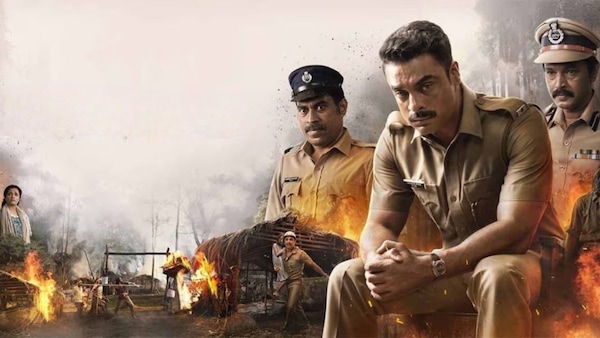
Promo poster for Narivetta.
Last Updated: 12.22 PM, May 25, 2025
ANURAJ MANOHAR’S debut film, Ishq (2019), does something interesting. It shows us a calculated act of violence and establishes a certain perspective. Later, it flips the narrative as well as the power imbalance by showing one of the victims, a heterosexual male who recovers from the ordeal quickly, perpetrate the same violence but this time to ghastlier ends in the name of revenge. As the film gradually becomes more and more uncomfortable, we understand that Manohar is interested in this cyclical nature sustained by the insecurities, frailties and ego of men. It makes a much larger point than a quid pro quo revenge act. Manohar’s new Malayalam film Narivetta also keeps moving around the vantage points, but from the view of the sole protagonist. It is clever but more straightforward in terms of storytelling and sociopolitical play than the first film. Yet, it makes for a solid sophomore film from the director.
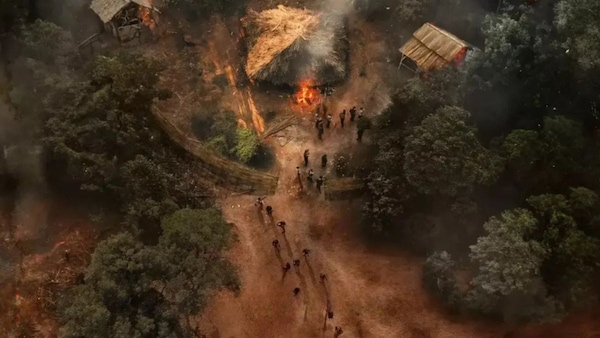
Narivetta is based on the 2003 Muthanga incident, where the police fired on Adivasis who had gathered to protest the government’s delay in allotting them land. With the screenplay by writer and Kerala Sahithya Akademi award winner Abin Joseph, Narivetta keeps the broad details intact, with some names changed. In the film, the protest also happens in Wayanad in 2003. And it is for the same purpose. Our protagonist is Peter Varghese (Tovino Thomas), a youngish slacker willing to wait forever for the exact government job he wants at the cost of his mother’s health and his lover Nancy’s (Priyamvada Krishnan) patience running out. Joseph and Manohar present Varghese as someone with no keen ideological bent; he is just a man coasting along. A compact scene establishes everything we need to know about him. He and his friend peacefully protest the delay in job allotment and expiration of their ranking list, and when he realises it is pointless, he suggests maybe they should gently break the law or pretend to take extreme measures to make some impact or at least get the media’s attention. The friend says he is a family man, but Varghese is single, and thus, maybe he can try. But Varghese doesn’t. It shows him as someone who is talented but without a drive or purpose. He never follows an idea through, and neither does he care about where his life is going. A momentary act of shame, a whiff of insult and the heartbreak of losing the woman he loves push him to accept the police constable job.
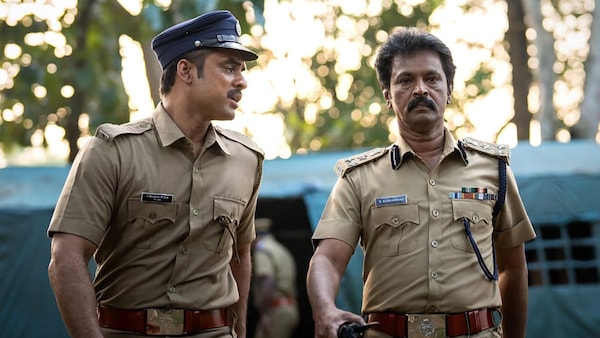
Narivetta is economical where it matters. Its transitions between Varghese’s story and the main characters in the Adivasi community and their daily lives are smooth and to the point. The narrative bounces between timelines, we enter as the plainclothes policemen detain Varghese unofficially and begin an interrogation at a place that is far from the zip code of a police station. Even as the idea that Varghese could be a hapless victim is presented, we see his reluctance and therefore unnecessarily aggressive approach to his first job. He beats up an old man, someone protesting the demolition of his home (state violence is front and centre in this film) on one of his first days in the field and seeing his greenhorn status lined by reddening rage, a helpful senior officer takes him under his wings. Suraj Venjaramoodu plays Basheer with quiet dignity. Self-appointed as Varghese’s mentor, he softens the edges of a thorny workplace. His team is dispatched to Wayanad to monitor the Adivasis' protests—led by Arya Salim’s Shanthi, a character based on CK Jaanu — and soon he falls on the wrong side of an agitation for which he held several radical ideas. While the state is the violent, oppressive force, Basheer is the lone officer attempting to humanise it, his empathy for the Adivasis apparent in his awareness that the police officers, even the hesitant ones like Varghese, have a home to return to while the protestors do not.
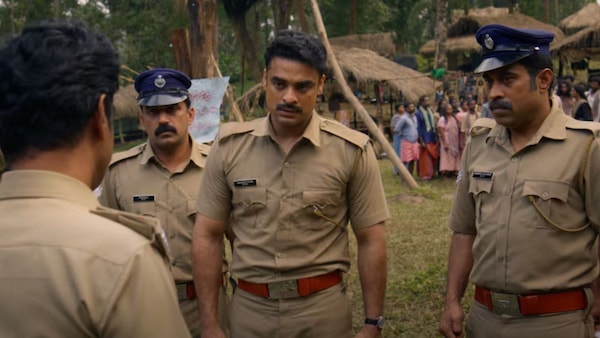
Narivetta plays with the slants it places Varghese in. He is at first cold and discomfited by his sheer presence among police officers. Later, his latent rage manifests as violent expression on the ill-fated Adivasis, a rebel without a cause or feeling. The film puts us, the audience, in a complex position. This is not a hero we root for, but this story is about Varghese, and the Adivasi protest is almost incidental for the most part. All his attempts at heroism are a show of force on the weak, something even his Machiavellian seniors reprimand him for. Any other time or place, Varghese would have exploded just as violently. With precision, the film uses the state’s own apparatus to shift our perspective of the main character. Cheran plays a savage senior policeman Keshav, a Tamilian whose diction leaps between Tamil and Malayalam with elastic ease. How he bends the strengths of Basheer and Varghese into their weakness informs the change in how we look at the whole picture.
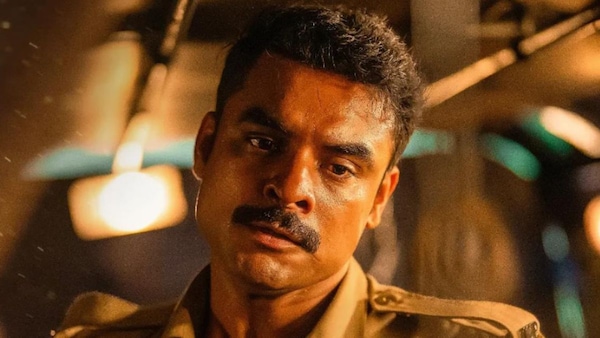
The film has some traditional but inspired shots to complement its play with viewpoints. Twice the film goes for a point of view gimbal shot with two characters doing the opposite action—one when Basheer falls backwards to the ground, and another when Varghese picks himself up and rises forward. The film then goes for its biggest moment; it takes Varghese out of the trenches and air drops him into the line of fire, where his loyalties are tested. An act of terror plays out with the good and evil clearly visible, and in the middle of every man's land is Varghese, trying to do the right thing wearing the wrong clothes, taking and dishing out, disproportionate and awkward in every limb and pore of his body. Chaos is a moment of clarity for a man coming of age. Tovino Thomas gives it all, he is very good at playing these deadbeats, but here he plays one who toils with others and also allows himself to be toiled with. It endears him after a point in the film.
The film isn’t as stylistic or as elegant in the way it closes its threads. There is some unwieldiness to its editing — the timelines of when Varghese approaches the courts and when he is caught by the police aren’t clear. It is the result of hastily tying up his story to put a ribbon on top. Manohar perhaps wanted a happy ending, but Narivetta might just have been a greater film with a sacrificial slacker at its centre.
